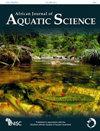Disaggregation and assessment of estuarine pressures at the country-level to better inform management and resource protection – the South African experience
IF 1
4区 环境科学与生态学
Q3 MARINE & FRESHWATER BIOLOGY
引用次数: 2
Abstract
Globally, the ability of estuaries to sustain functionality and productivity is deteriorating rapidly under ever-increasing anthropogenic pressures. We present a systematic approach to identify, characterise and rank global pressures affecting estuaries. Six main pressure categories are reviewed: freshwater flow modification; pollution; exploitation of fish and invertebrates; land-use and development; manipulation of inlets; and biological invasions (plants and fish). Patterns in pressure effects are evaluated across biogeographic regions and estuary types. Activities contributing to these pressures are identified to prioritise management interventions and assessments of the trajectories of change and data availability are estimated, with associated confidence ratings on these. Approximately 15% of national estuarine area is under severe flow modification pressure. Land-use and development result in severe pressures on 40% of the area. Approximately 15% of inlets are artificially manipulated, which affects 60% of estuarine area. Pollution places 34% of the area under severe pressure and 78% of the area is severely impacted by overfishing. Invasive terrestrial vegetation has infested a third of South African estuaries, and aquatic invasive plant species occur in at least 8% of estuaries. Alien or extralimital (translocated) fish cause severe pressure in 35% of the estuaries. Management responses to mitigate these impacts are recommended for systems under severe pressure and future research directions are identified.在国家一级对河口压力进行分类和评估,以便更好地为管理和资源保护提供信息——这是南非的经验
在全球范围内,河口维持功能和生产力的能力在不断增加的人为压力下迅速恶化。我们提出了一种系统的方法来识别、表征和排序影响河口的全球压力。审查了六个主要压力类别:淡水流量修正;污染开发鱼类和无脊椎动物;土地使用和发展;进水口操作;以及生物入侵(植物和鱼类)。对生物地理区域和河口类型的压力效应模式进行了评估。确定了造成这些压力的活动,以优先考虑管理干预措施,并估计了变化轨迹和数据可用性的评估,以及对这些活动的相关信心评级。大约15%的国家河口区正处于严重的流量修正压力之下。土地使用和开发给40%的地区带来了巨大的压力。大约15%的进水口是人工操纵的,这影响了60%的河口区域。污染使34%的地区面临严重压力,78%的地区受到过度捕捞的严重影响。入侵的陆地植被已经侵扰了南非三分之一的河口,水生入侵植物物种出现在至少8%的河口。外来或超界限(迁移)鱼类在35%的河口造成严重压力。建议管理层对处于严重压力下的系统采取缓解这些影响的措施,并确定未来的研究方向。
本文章由计算机程序翻译,如有差异,请以英文原文为准。
求助全文
约1分钟内获得全文
求助全文
来源期刊

African Journal of Aquatic Science
MARINE & FRESHWATER BIOLOGY-
CiteScore
3.90
自引率
7.10%
发文量
31
审稿时长
>12 weeks
期刊介绍:
The African Journal of Aquatic Science is an international journal devoted to the study of the aquatic sciences, covering all African inland and estuarine waters. The Journal publishes peer-reviewed original scientific papers and short articles in all the aquatic science fields including limnology, hydrobiology, ecology, conservation, biomonitoring, management, water quality, ecotoxicology, biological interactions, physical properties and human impacts on African aquatic systems.
 求助内容:
求助内容: 应助结果提醒方式:
应助结果提醒方式:


